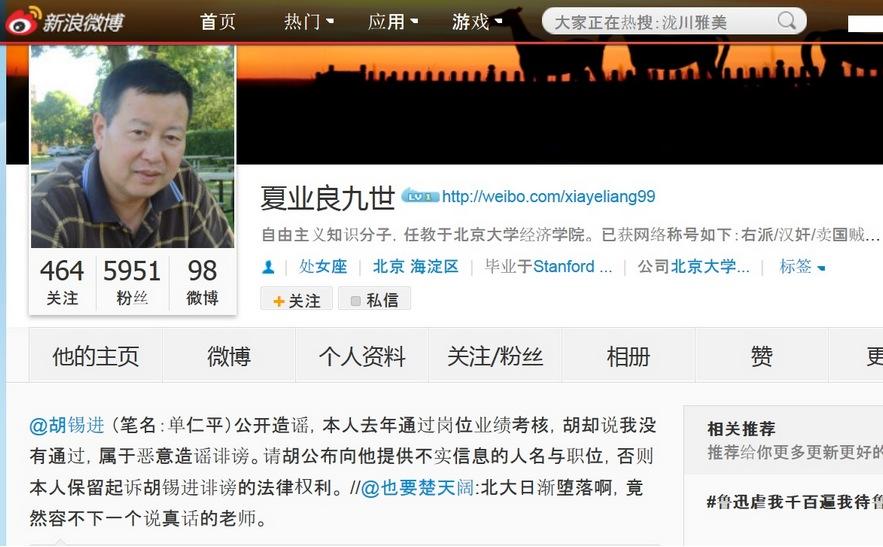Chinese authorities have over the last few months been in a full flight attack on what they call “rumors,” and those who propagate them, on the Internet. Rumors are a threat to social stability, Party propaganda officials say, through the multiple newspapers, websites, and television stations they control.
But what if the Chinese regime’s own mouthpieces were guilty of spreading rumors, as they accuse so many others of doing?
Xia Yeliang, an economics professor at Beijing’s prestigious Peking University, said he was prepared to put the idea to the test, in a recent post on his microblog account.
The editor-in-chief of the Global Times, a nationalistic state-run newspaper, had claimed in an editorial that Xia failed to pass a teaching evaluation last year (adding, too, that Xia’s “liberal political beliefs” were “very extremist.”)
Xia, in fact, had passed the evaluation. He said that Hu’s suggestion that he had not would qualify as “malicious rumor and slander,” and stated that a lawsuit wouldn’t be out of the question.
In particular, the Global Times editorial was forwarded more than 500 times, and viewed by more than 5,000 Internet users. This piece of arcana is important, because the Supreme People’s Court and the Supreme People’s Procuratorate issued a judicial interpretation recently, stipulating that people will face defamation charges if rumors they post online shared or viewed that many times.
Netizens were quick to leap to Xia’s defense, arguing that under the Party’s own new guidelines, its mouthpiece newspaper Global Times should be punished for spreading rumors.
Xia followed up with another message recruiting lawyers, who would explore ways to file a suit against Hu Xijin, pro bono.
Xia Yeliang was named one of the 100 most influential Chinese public intellectuals from 2009 to 2013, and has also recently been the center of a controversy between Peking University, the Chinese leadership, and Wellesley College, a private university in Massachusetts.
Xia’s university in China has threatened to hold a faculty vote on whether he should be ousted for his errant views on the value of democracy and the rule of law. The gesture has the clear mark of the central leadership, who are currently engaged in a campaign to snuff out the development of democratic ideas in China. In response, nearly a third of the faculty of Wellesley College said they would demand the cessation of all partnerships between Wellesley and Peking University if Xia were expelled.
Xia is not the only one being put under tremendous pressure. Since the recent crackdown on Internet rumors started, several hundred Chinese netizens have been arrested in just one week during August, according to Southern Weekend.
But netizens, like Xia, are pushing back.
One blogger’s post on club.kdnet.net, a popular online forum, went viral. The post, titled “I collected a list of Internet rumors, please punish the rumor mongers according to the law,” consisted of screenshots of state-media’s reports which were later shown to be false. One of the examples illustrated that in 2006 the Health Ministry denied that China took organs from death row inmates, but admitted in 2012 that organs from death row inmates were the major source of organs for China’s transplant industry.
Professor Xia said he was not optimistic that Hu would be brought to justice. “Although it’s unlikely to happen in China, but if the judicial interpretation was published, it should apply to everyone,” he said in an interview with New Tang Dynasty TV.
Xia returned to China on Aug. 30 after concluding his one year-term as a visiting scholar at Stanford University. He told Deutche Welle that the situation on campus in China is worsening, compared to last year. “The atmosphere is tense and it’s turning leftward. I can feel a Cultural Revolution-like atmosphere.”
He also said he is disappointed in the Chinese regime’s new leadership. “It has gotten more politically backwards. Cultural Revolution-like language and ideology is back again now,” he said in an interview with Radio France Internationale.
“In many places there are political study sessions to study Marxism,” he said. “The crackdown on so-called Internet rumors is meant to give people less room to speak and to not let people speak freely.”
But he said he is not afraid. “China is now at a critical point in history. More than ever, members of Peking University should speak up and say what people expect from intellectuals,” he told Deutche Welle.
Historically, Peking University was well known for its freedom of thought. It was the center of China’s new culture movement and many other modern political movements.
“If Peking University is afraid to speak up, what kind of university will that be?” he remarked. “It will have lost its soul, and the spirit of Peking University would be dead.”


